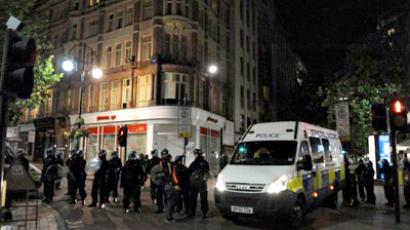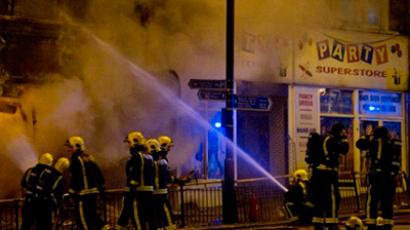‘It's a Revolt!' Students march in London
Students took to the streets of London en masse on Wednesday to fight funding cuts and a massive hike in tuition fees. At least 20 arrests have been made, though police abstained from using plastic bullets, which they had threatened to earlier.
Despite the massive inflation of tuition fees, which are expected to triple to £9,000 per year by 2012, the tuition fee hikes are not the only change British students are campaigning against. They are also protesting against proposed education cuts and the “privatisation” of their education, as private companies will now be able to offer university degrees for the first time.“Our education is not their business” is the main slogan of today’s protests.The demonstrators gathered at the University of London in the center of the city around noon. Some 10,000 people were expected to take part in the march against the privatization of education and other attacks on the welfare state. However RT’s Ivor Bennett, who is reporting from the scene, estimated that only several thousand had shown up as the march began. Other estimates put the total number of protestors at 5,000.It has also been reported that a group of protesters managed to break away from the main route, where they went on to erect around two dozen tents in the heart of the city on Trafalgar Square.Otherwise, the police have thus far been successful in managing the march, keeping protestors away from potent symbols like the Bank of England and the London Stock Exchange.Having been criticized for their mishandling of previous protests, the police announced they would be out in force this time around. With 4,000 officers being deployed, the run-up to the march was fraught with tension.Speaking with RT, Ben Beech from the National Campaign Against Fees and Cuts said he expects violence during the march.“I think it’s likely we will see violence. I mean, there’s 4,000 people who are essentially the largest gang in London, from the Metropolitan Police,” Beech told RT.Beech alleged that “since 1998, the Metropolitan Police Service has killed over 300 in their custody.”When questioned about the increasingly aggressive police tactics which include the use of plastic bullets, Beech was equally critical: “Plastic bullets have a steel core and they are coated in rubber. These are bullets and they kill,” he said. “It says very much how hollow our democracy has become when dissent in this country is met only by threatening school children and students. I mean we’re talking about school children here facing weapons that can kill. This is not a proportionate response,” Beech continued.
The Metropolitan Police Service (MPS) has pre-approved the firing of plastic bullets for the first time on the British mainland.In a further move to intimidate demonstrators, police sent dozens of letters to anti-cuts activists warning them of dire consequences if they attend the march.Beech described the move as “a cynical ploy by the Met to pre-criminalize the protest before it’s happened” as police were attempting “to scare people away from coming,” he said.Ultimately, Beech believes the increasingly heavy-handed police tactics are a sign that the government has lost its legitimacy.“This is a government with no mandate for its austerity measures that is forcing society to pay for a crisis that it did not create and the only way it is going to be able to do that over the coming years is through increasing levels of state violence,” he told RT.As marchers are later expected to meet up with Occupy London protestors camping out at Saint Paul’s Cathedral, fears are widespread that an overreaction on the part of the police could turn the peaceful protest violent.However, Chris Nineham from the Coalition of Resistance told RT the police in fact could prevent a violent outcome if they choose to. “The only role the police should be playing is to facilitate the right to peaceful protest, this protest will be peaceful unless the police weigh in and start kettling people, and start harassing people, or God forbid, use ammunition against them,” Niniham said.
Wednesday’s march comes a year after thousands rallied against the government’s plans to reform the education system. In the ensuing chaos, a few troublemakers ransacked the Conservative Party headquarters, and hundreds were arrested as a result.














